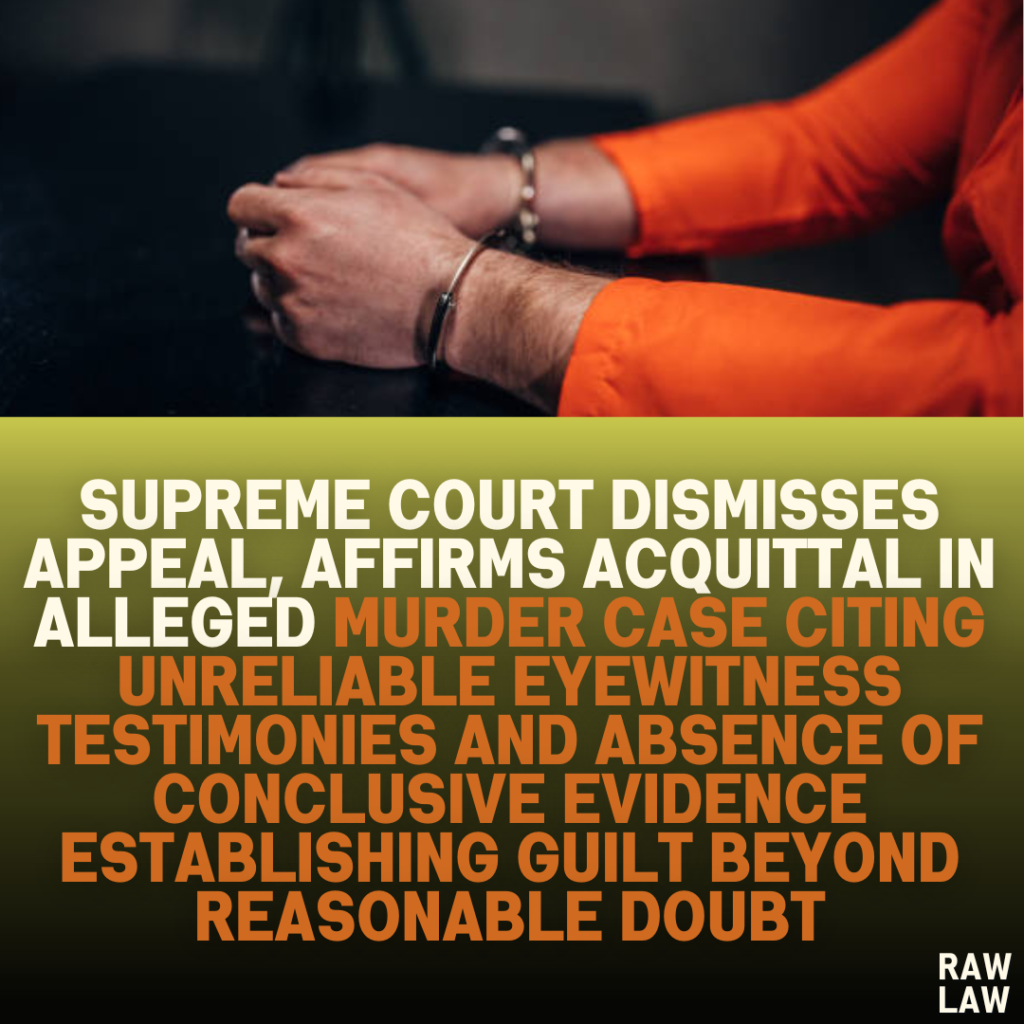Court’s Decision
The Supreme Court dismissed the appeal by the State of Madhya Pradesh against the acquittal of the accused in the murder of Naseem Khan. The court upheld the High Court’s judgment, emphasizing that the prosecution failed to prove guilt beyond reasonable doubt due to inconsistencies in eyewitness testimonies and lack of corroborative evidence.
Facts
The incident occurred on October 1, 1996, when the accused allegedly attacked Naseem Khan near a village well, leading to his death. The trial court convicted the accused based on testimonies from Naseem Khan’s minor brothers (PWs 5 and 9) and his mother (PW-8), the informant. However, the High Court reversed this decision, granting the accused the benefit of doubt, which led to their acquittal.
Issues
The primary issue before the Supreme Court was whether the High Court erred in acquitting the accused by disregarding the trial court’s reliance on eyewitness testimonies that linked the accused to the murder.
Petitioner’s Arguments
The State argued that the trial court had rightly convicted the accused, relying on consistent and corroborated eyewitness accounts. It contended that the High Court erred by discarding reliable testimonies, thus allowing guilty individuals to evade justice.
Respondent’s Arguments
The respondents contended that the High Court correctly acquitted them, as the prosecution’s evidence was inconsistent and unreliable. They emphasized that the High Court found contradictions in the testimonies of the prosecution’s primary witnesses, which cast doubt on the reliability of the evidence presented against them.
Analysis of the Law
The Supreme Court reviewed the legal standards for appeals against acquittal, reaffirming that interference is warranted only if the lower court’s decision is patently unreasonable or perverse. It noted precedents establishing that benefit of the doubt should be given where there are material contradictions in prosecution testimonies that impair credibility.
Precedent Analysis
The court cited cases, including Jai Karan v. State of U.P. and Govindaraju v. State by Sivaramapuram PS, emphasizing that mere divergence in trial court and appellate court findings does not warrant Supreme Court intervention unless there is clear perversity in the lower court’s appreciation of evidence.
Court’s Reasoning
The court held that the High Court was justified in its scrutiny of the prosecution’s evidence, especially considering the discrepancies in the testimonies of PWs 5, 8, and 9. It observed that the trial court had not adequately considered contradictions in the witnesses’ statements, particularly regarding an alleged oral dying declaration by the deceased and the absence of corroboration of injuries with the accused’s actions. Given these omissions, the High Court’s finding that the accused were entitled to the benefit of doubt was reasonable.
Conclusion
The appeal was dismissed, and the Supreme Court upheld the High Court’s decision, asserting that the prosecution failed to conclusively prove the accused’s guilt beyond reasonable doubt.
Implications
The judgment reinforces the principle that appellate courts should refrain from overturning acquittals unless there is clear evidence of erroneous reasoning or perversity. It also underscores the importance of consistency in witness testimonies and the necessity for prosecution evidence to be free of significant contradictions to secure a conviction.



